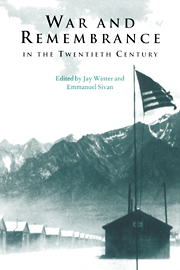Book contents
- Frontmatter
- Contents
- Preface
- Introduction
- 1 Setting the framework
- 2 Forms of kinship and remembrance in the aftermath of the Great War
- 3 War, death, and remembrance in Soviet Russia
- 4 Agents of memory: Spanish Civil War veterans and disabled soldiers
- 5 Children as war victims in postwar European cinema
- 6 From survivor to witness: voices from the Shoah
- 7 Landscapes of loss and remembrance: the case of Little Tokyo in Los Angeles
- 8 The Algerian War in French collective memory
- 9 Private pain and public remembrance in Israel
- 10 Personal narratives and commemoration
- 11 Against consolation: Walter Benjamin and the refusal to mourn
- Index
- Studies in the Social and Cultural History of Modern Warfare
11 - Against consolation: Walter Benjamin and the refusal to mourn
Published online by Cambridge University Press: 27 October 2009
- Frontmatter
- Contents
- Preface
- Introduction
- 1 Setting the framework
- 2 Forms of kinship and remembrance in the aftermath of the Great War
- 3 War, death, and remembrance in Soviet Russia
- 4 Agents of memory: Spanish Civil War veterans and disabled soldiers
- 5 Children as war victims in postwar European cinema
- 6 From survivor to witness: voices from the Shoah
- 7 Landscapes of loss and remembrance: the case of Little Tokyo in Los Angeles
- 8 The Algerian War in French collective memory
- 9 Private pain and public remembrance in Israel
- 10 Personal narratives and commemoration
- 11 Against consolation: Walter Benjamin and the refusal to mourn
- Index
- Studies in the Social and Cultural History of Modern Warfare
Summary
No student of the mysteries of collective memory can fail to acknowledge that those who do the remembering stubbornly remain individuals whose minds resist inclusion in a homogenous group consciousness. The dialectic of exterior, public commemoration of the past and its interior, private traces refuses easy reconciliation. It is thus fitting that a book on the ways in which cultures struggle to remember and memorialize concludes with a chapter focusing on a single figure, whose life and work was devoted in large measure to an exploration of the ways in which the past haunted the present, as well as offered a possible resource for the future.
What makes the choice of this specific individual especially appropriate is that his thoughts on the modalities of memory were stimulated by the violent trauma of the First World War, the cataclysmic event whose rupturing of the continuity with the world that preceded it brought to a head the ‘memory crisis’ that began in the nineteenth century. Moreover, while a fiercely idiosyncratic thinker, ‘à l'écart de tous les courants’, as his friend Theodor W. Adorno called him, Walter Benjamin arrived at insights into the dialectic of memory and trauma that gradually found a receptive audience. They have, in fact, come to be extraordinarily influential on many current considerations of these highly vexed themes. Our collective memory of the modern era, it can be said with only slight exaggeration, has increasingly been shaped by the unique ruminations of this isolated intellectual.
- Type
- Chapter
- Information
- War and Remembrance in the Twentieth Century , pp. 221 - 239Publisher: Cambridge University PressPrint publication year: 1999
- 15
- Cited by



